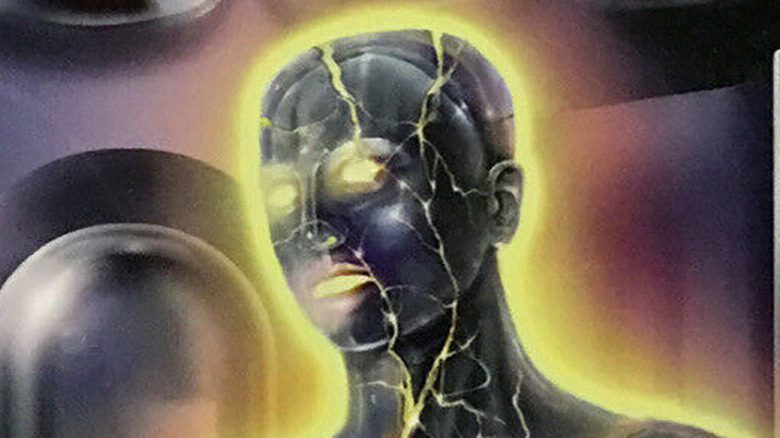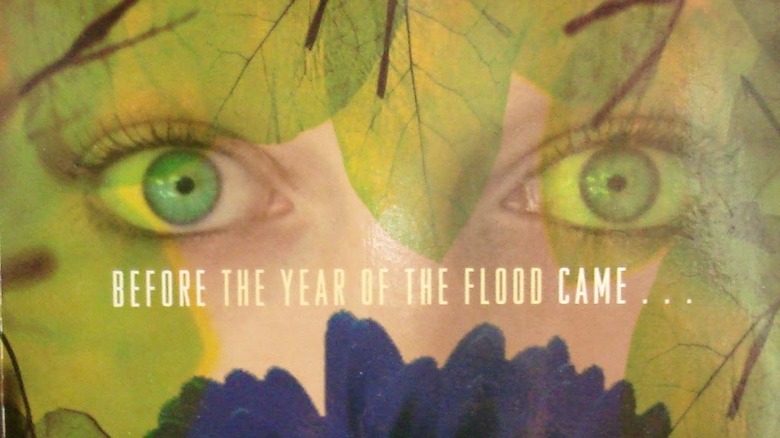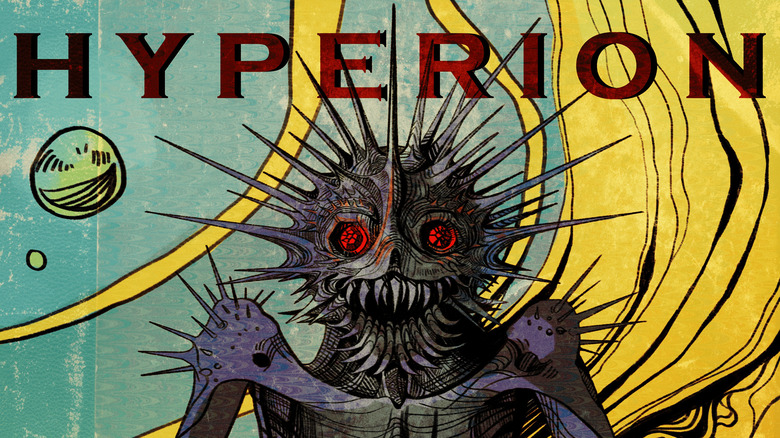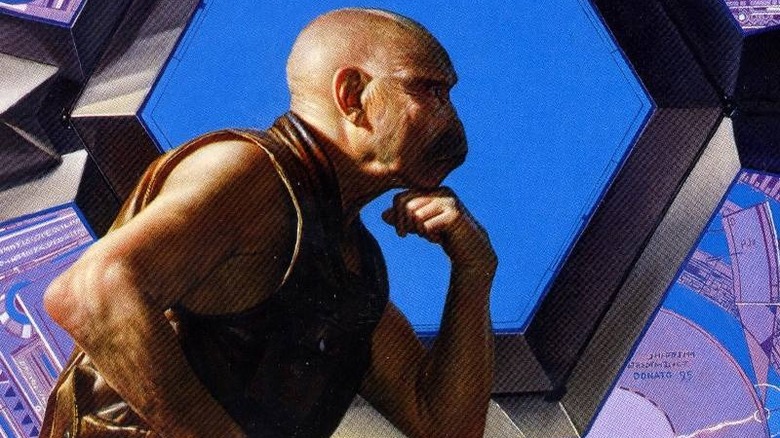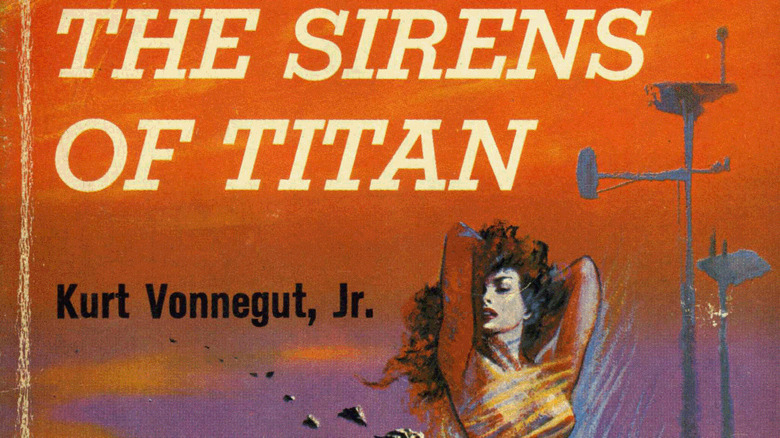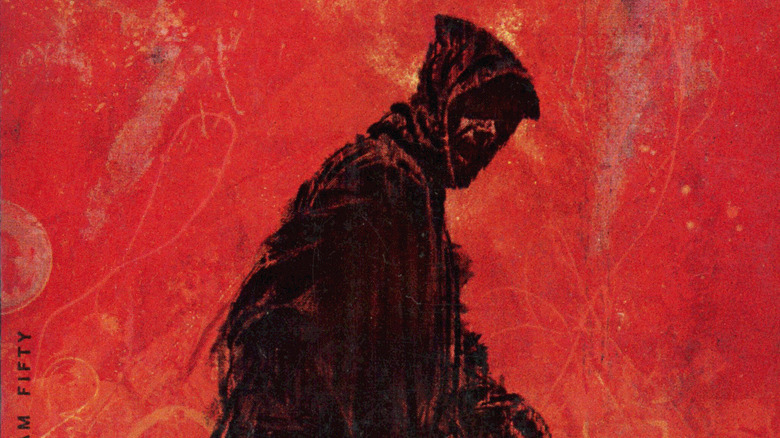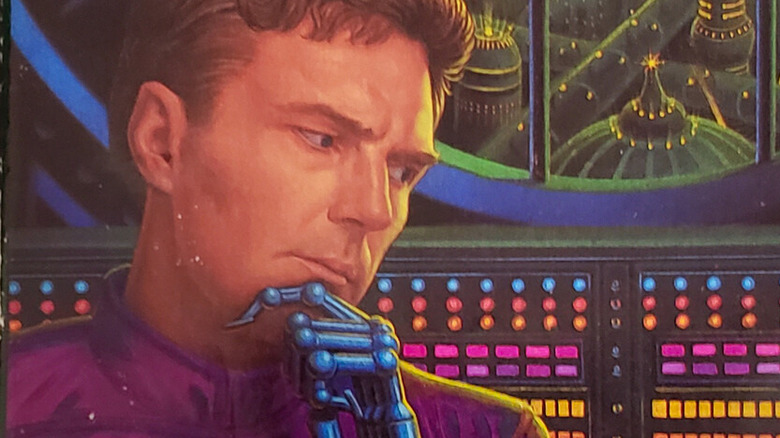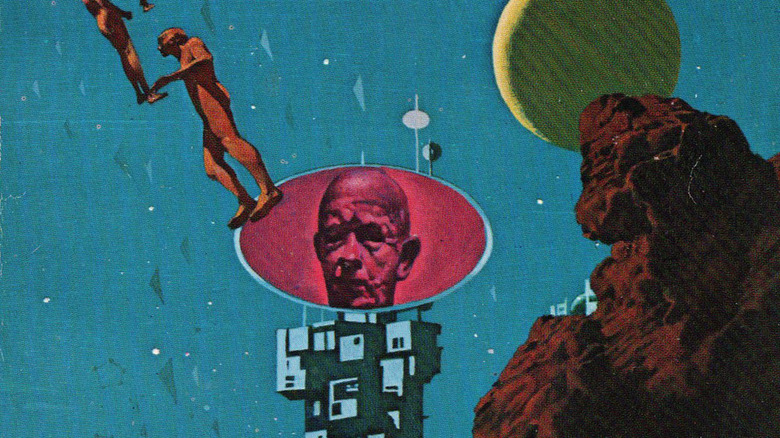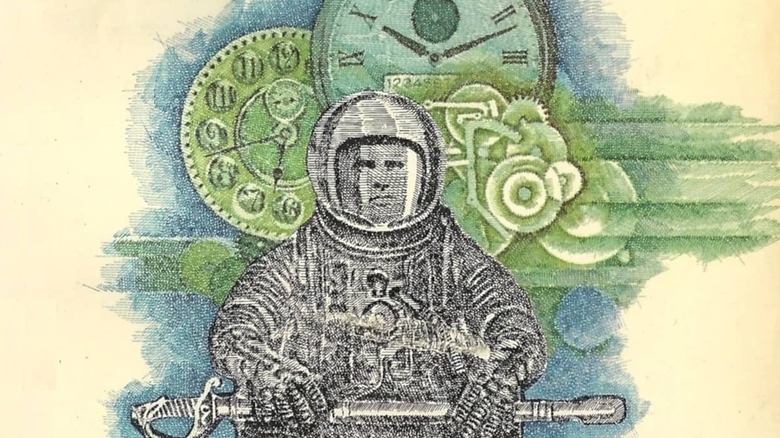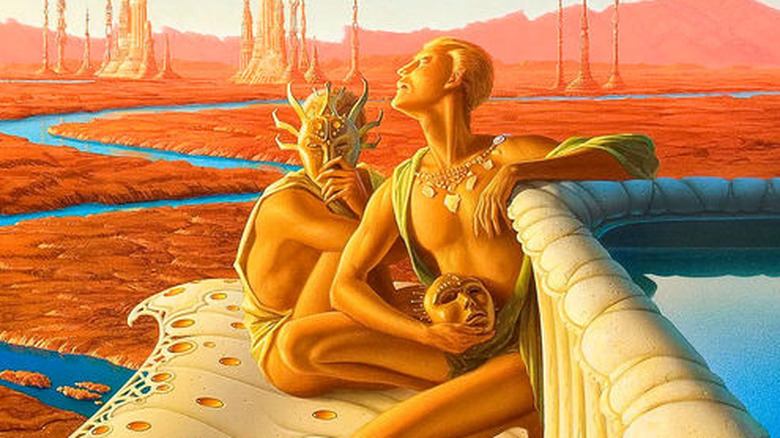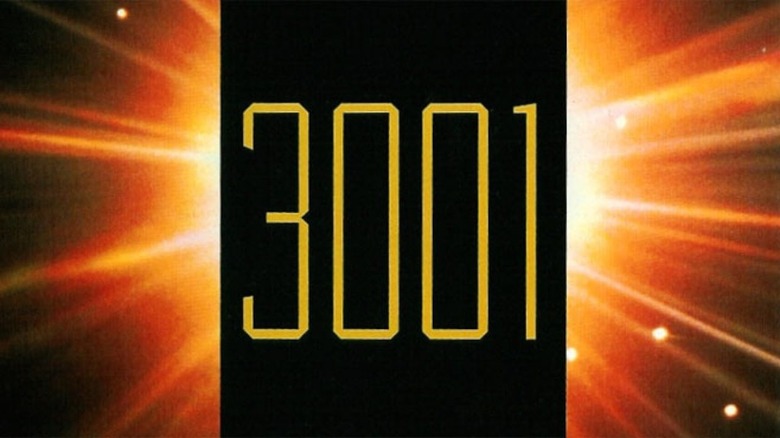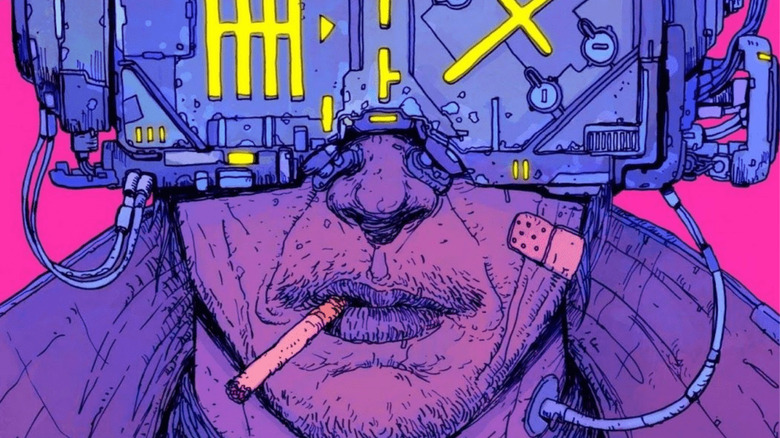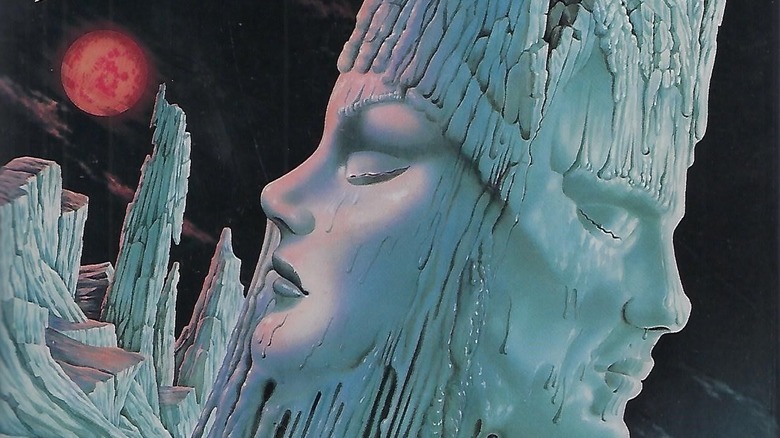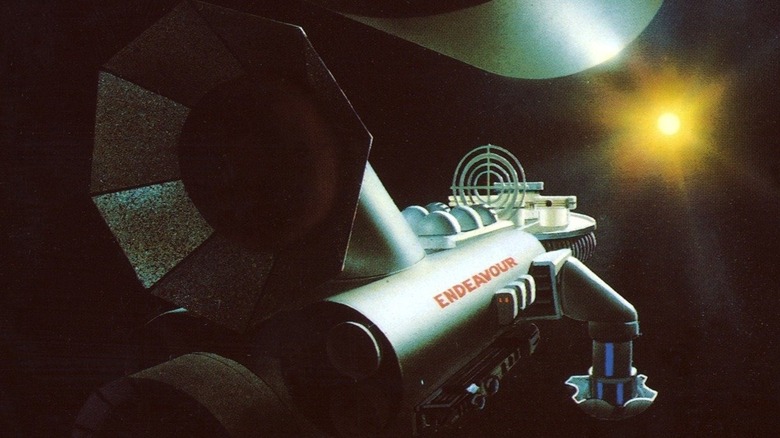Sci-Fi Book Adaptations We Want To See On The Big Screen
Over the last few years, it's become abundantly clear that audiences have a thirst for sci-fi epics that has yet to be fully quenched. Cinema lovers crave Homeric outer space sagas, and with previously 'unfilmable' books being successfully turned into films and TV shows (think "Dune" and "Watchmen"), the sky is the limit to what we might see next. There are nearly 70 years of science fiction stories — novels, multi-book franchises, short stories, and novellas — for movie studios to mine from, and some of the biggest and best interstellar epics, space adventures, cyberpunk thrillers, and dystopian apocalypse stories remain untouched by Hollywood. Legendary science fiction authors like Isaac Asimov and Robert Heinlein have written a number of incredible classic books that are just waiting to be used.
Some have been attempted before as failed TV movies; others have seen Hollywood interest but are stuck in development hell. With Denis Villeneuve's "Dune" now rising on the 2021 box office charts, what other iconic science fiction novels might we expect to see adapted to the big screen? Which ones might now get renewed attention? Whether you're a Hollywood executive looking for what could be the next big thing, a movie-goer in search of your next read, or just a curious book lover wondering what's on tap, scroll on to see what we're hoping to see come to life.
Oryx and Crake
From the mind of Margaret Atwood comes "Oryx and Crake," a dystopian, post-apocalyptic work of speculative fiction of a future that could come to pass if we're not careful. One of the acclaimed author's most breathtaking works, the world of "Oryx and Crake" will surely invoke comparisons to her other major work, "A Handmaid's Tale," but they are very different stories. For one, "A Handmaid's Tale" is set in a world where the living nightmares have sprung from an extrapolation of conservative moral outrage culture, whereas "Oryx and Crake" is based mostly in a "Black Mirror"–style world that warns us of technology run amok.
In this world, our tampering with genetics has brought mankind to the brink of extinction. It's a twisted vision of the future of humanity with hybrid people — part man, part animal — roaming the desolate landscapes, and the narrative follows the last full human on Earth, a person called "Snowman" attempting to survive and uncover the mystery of this lost apocalypse. It's a dark, frightening tale, and one worthy of an adaptation. With the pedigree of Atwood — whose "A Handmaid's Tale" was such a big hit on TV — combined with its mix of sci-fi, adventure, and romance, "Oryx and Crake" has all the ingredients of a blockbuster on its hands. It feels like just a matter of time before we see this on the silver screen.
Hyperion
If Hollywood is looking for another sweeping, multipart franchise, "Hyperion," by author Dan Simmons, is the clear answer. Encompassing four sprawling novels and multiple short stories, "Hyperion Cantos," as it's called in sum, is essentially "The Canturbury Tales" in space. Told as a series of interwoven tales that span multiple time frames, the first book follows seven pilgrims in a far-off future, each on their own journey to meet "The Shrike," a powerful and mysterious being capable of tremendous malevolence. "Hyperion" features a vast and complex history involving multiple planets, star systems, and different realms that defy conventional description. The story is a high-concept saga that includes all manner of different characters, including monks, soldiers, and time travelers. The conflicts occur on a galactic scale. Hailed as one of the great modern sci-fi series, it has been the subject of numerous adaptation attempts since its first publication in 1988.
"Doctor Strange" director Scott Derrickson was to helm a since-aborted attempt to make a film of the series in 2009, while actor Bradley Cooper and his "Hangover" director Todd Phillips announced another attempt in 2015, this time as a Sy-Fy original series. After years of the adaptation being stuck in development, there was finally some movement just recently, with it being shifted to a film at Warner Bros., though there's no longer any mention of Phillips' involvement. Perhaps the success of "Dune" propelled the sudden move forward. We're excited to see it finally be adapted to the big screen.
Ringworld
One of the few remaining classic space series of the 1960s that has yet to see adaptation, Larry Niven's "Ringworld" tells the story of a colossal ringed structure that rotates around a distant star in a universe called "Known Space." A variety of Niven's other works are set in the same universe of "Known Space," but it's the original titular novel that remains the most memorable of his "Ringworld" stories. The first book in a massive universe of stories, "Ringworld" follows a group of adventurers who discover the great cosmic ring, a previously uncharted region of space, and attempt to uncover its secrets. It's an ambitious and scientifically logical work of fiction, often billed as so-called "hard science fiction" that examines the inner workings of its monumental ideas and broad concepts.
"Ringworld" is legendary in sci-fi circles, having influenced several other works, from "Star Trek" to "Halo." There have been a number of unsuccessful attempts at bringing the book to audiences, from television to cinema, with Amazon Studios most recently acquiring the rights to the entire series. Since its announcement in 2017, there has unfortunately been no update, but with a little luck, and other similar projects now gaining momentum, we may just see "Ringworld" take shape sooner than later — hopefully as a big-budget feature.
The Sirens of Titan
Kurt Vonnegut is more than a science fiction writer; he's one of the 20th century's most notable authors. His works include the acclaimed "Cat's Cradle," "Slaughterhouse Five," and "Mother Night." But his first sci-fi entry, "The Sirens of Titan," has become a classic of the genre. Ostensibly an action-adventure about a Martian invasion of Earth, "The Sirens of Titan" is much more a satire. It's the story of Malachi Constant, one of the richest men on Earth, and his travels to Mars and its moon Titan, where he attempts to thwart an interstellar war and learns dark truths about mankind.
It's an absurdist science fiction tale, but one with a darker message about human nature and decidedly religious undertones. Vonnegut clearly believes it's hubris to think of mankind as the center of creation, and "The Sirens of Titan" is the work that demonstrates this worldview best. The book's potential as both a science fiction adventure and a satirical comedy has led it to be optioned by Dan Harmon, co-creator of "Rick & Morty," though it's been in limbo since 2017. Our hope is to see a film adaptation soon.
A Canticle for Leibowitz
A so-called "social science fiction" novel, "A Canticle for Leibowitz" by Walter J. Miller fits firmly into the category of post-apocalyptic sci-fi. Like many before and after it, the book warns of the dangers of nuclear weapons, technology, and the proliferation of global wars. It's one of the most beloved books of its genre and has been discussed in schools for decades for its themes of science vs. faith, secular ethics, and redemption. It follows the monks of the Albertian Order of Leibowitz — keepers of knowledge during the dark times that followed the fall of civilization — and is set in their monastery, which has survived a devastating nuclear war. The story of the monks spans more than a thousand years as the world slowly rebuilds, but is leery of the renewed advancement in technology that the Order proposes. It won the 1961 Hugo Award for best science fiction novel for good reason, as it is a provocative, downright chilling indictment of mankind's lust for violence. A sequel was written in 1996, shortly before Miller's death.
Though there have been a couple of adaptations, as a radio drama and a BBC theater play, no serious attempts at a film have ever materialized. We're hoping that changes, as "A Canticle for Leibowitz" is more than deserving of the big-screen treatment.
The Moon Is a Harsh Mistress
Robert Heinlein is one of the pillars of classic science fiction, right next to the likes of Isaac Asimov and Arthur C. Clarke. Some of his works that have made it to the screen include "The Puppet Masters," starring Donald Sutherland; "Predestination," starring Ethan Hawke; and his most famous, the 1996 space action movie "Starship Troopers," from director Paul Verhoeven.
One of Heinlein's more popular works in the genre however was "The Moon Is a Harsh Mistress," a 1966 novel set in the year 2075, when the Earth's moon has become an inescapable penal colony. The lunar civilization is lawless, with only the most critical administration offered from "Terra" below. It's intended to rehabilitate criminals, but the inhabitants soon form their own impromptu governments that fight one another. As the colony predictably starts to fall apart, a revolution against their "wardens" on Earth begins to take shape. It's an overtly political work that could play well with modern audiences and would make for a compelling film with the right team behind it. In 2015, director Bryan Singer was attached to helm a feature film version for Fox, but since the company's acquisition by Disney, it appears the project has been put on the back burner. Perhaps a new director could get the project moving again.
To Your Scattered Bodies Go
"To Your Scattered Bodies Go" is the first in the so-called "Riverworld" series by author Philip Jose Farmer. It focuses on the real-life adventurer Richard Francis Burton — the man who wrote "The One Thousand and One Nights" — who, after his death as an old man, wakes up along the banks of a river in a young, healthy body. Also along the banks of the river? No less than every human being who has ever lived, from Mark Twain and Hermann Goering to Eric the Red and Genghis Khan.
Over the course of the series, a motley crew from different times and places works together to reach the end of the river and discover the secret of who resurrected them and why. It's a mix of adventure and science fiction, complete with action, mysteries, and shocking revelations about the future of mankind. It's all set against the backdrop of the greatest sociology experiment ever, as people from all throughout history slowly build a civilization from scratch. If done right, "To Your Scattered Bodies Go" and its sequels could be a true epic, a combination of high fantasy, science fiction, and old-fashioned adventure. Think "Lost" meets "Game of Thrones" with a little "X-Files" for good measure.
"Riverworld" was attempted twice as a low-budget television movie, but neither was very good, nor faithful to the book. We're hoping a big-budget film could do it justice.
The Forever War
If a centuries-long war with a malevolent race of alien space warriors doesn't make for good source material for the next big sci-fi movie, we're not sure what does. Author Joe Haldeman's classic book series consists of "The Forever War," published in 1974, and a sequel released decades later, "Forever Free." The pair of novels chronicle an interstellar conflict between Earth and the Taurans, a highly advanced alien race. The story involves heavy use of time dilation, where the war in space lasts just years, but centuries pass back on Earth. When soldiers return home, they find it a place they no longer recognize. The books discuss some heavy issues, not least of which are the politics and ethics of war. It's a story ripe for a movie adaptation now that such vast epics are proving popular.
"The Forever War" has been optioned several times for film, most notably by Ridley Scott in 2008. By 2014, Joe Haldeman said the script was still being worked on. A year later, it was announced that Warner Bros. had acquired the rights and was working with Channing Tatum on an adaptation. It's been six silent years since, and it feels like the film is forever in development. It's high time we saw the story up on the screen.
The Martian Chronicles
Ray Bradbury, another pillar of classic science fiction, is one of the most adapted authors in the genre. His works have been featured on "The Twilight Zone" and "Alfred Hitchcock Presents," have become movies like "Fahrenheit 451," and even formed the basis for the 1985 anthology TV series "Ray Bradbury Theater" that ran for five seasons on HBO. But his greatest work may be "The Martian Chronicles" — a grand piece of dystopian fiction that sees the Earth devastated by nuclear war, and the human race reach for the stars, eventually settling on Mars after a lengthy war with the planet's inhabitants. The series encompasses a number of connected short stories that span three decades of chronological events. It touches on controversial topics ranging from war and political struggle to colonialism and immigration. It's one of the great science fiction sagas, and perhaps one of the broadest in terms of its exploration of modern society and human nature.
Like "Dune," it has been adapted once before, as a TV miniseries starring Malcolm McDowell and Rock Hudson in 1980, but it was largely a failure, unable to live up to the grandiose ideas in Bradbury's novels. Several of the short stories were turned into episodes of his anthology series, "Ray Bradbury Theater," but in today's age of luscious, high-production science fiction films, it's time that "The Martian Chronicles" gets a shot as a blockbuster film series.
3001: The Final Odyssey
In addition to being one of the most famous authors in science fiction, Arthur C. Clarke is also the writer behind one of the most important science fiction films ever, "2001: A Space Odyssey." The Kubrick classic was based on his book of the same name, which embraced the awe and mystery of the cosmos at the dawning of the space race in the 1960s. A sequel, "2010: The Year We Make Contact" was released in 1984, with an understandably more obvious Cold War theme. No movie was ever made of the third or four sequels, though, the last of which was published in 1997, a decade before Clarke's death.
"3001: The Final Odyssey" is set a thousand years later, and its massive narrative reveals more of the cosmic mythology at the heart of the saga. We see the return of Frank Poole, the astronaut killed in the first film, as he reemerges a millennia later, and "Halman," a merging of Hal-9000 and astronaut Dave Bowman, who now exist as a unified digital lifeform. The story delves deeper into the history of the monolith, and while some may want an adaptation of the third book, "2061: Odyssey Three" first, "3001: The Final Odyssey" is largely unrelated. It would make for an incredible, sweeping sci-fi drama and give audiences a look into the future of humanity from one of the 20th century's most brilliant, forward-thinking minds.
Ridley Scott had signed up to produce an adaptation at one point, but all has been dark on that front since the announcement in 2014. Perhaps a feature film adaptation could be the answer.
Neuromancer
William Gibson's 1984 debut novel, "Neuromancer," set the standard for "cyberpunk" — the subgenre of science fiction set in a not-so-distant, dystopian future where technology dominates. Its arc centers on hackers, corrupt corporations, and the common street-level protagonists who take back control. Movies like "Ready Player One," and "The Matrix" draw elements from the genre, and new cyberpunk stories in other media continue with the likes of "Altered Carbon" and the video game "Cyber Punk 2077." Gibson's own "Johnny Mnemonic" was turned into a film starring Keanu Reeves in 1995. It's long past time that his greatest work, "Neuromancer," received a big-budget adaptation.
"Neuromancer" is the story of Henry Case, a small-time crook and ex-computer hacker eking out a meager living on the streets of Japan. He's lost his skills due to a debilitating drug addiction that has afflicted his capacity to access the matrix that runs cyberspace. He is offered the chance to regain his hacking abilities if he assists a man named Armitage in a particularly risky job. Essentially a crime noir thriller turned cyberpunk epic, the book delves into the vast conspiracies and the dark underbelly of society. "Neuromancer" remains as fresh and relevant as ever, partly thanks to its surprisingly accurate prediction of future technology. It's a seminal work of science fiction, but despite attempts by Vincenzo Vitale ("Cube") and, more recently, Tim Miller ("Deadpool"), it has never been translated to film.
The Left Hand of Darkness
Reading the premise of the sci-fi classic "The Left Hand of Darkness" one might think it was a contemporary look at sex politics, but Ursula K. Le Guin, one of the genre's premiere authors, wrote her groundbreaking novel in the late 1960s. The story delves deep into gender identity and sexuality in a way that feels even more relevant today. But the issues it explores were not irrelevant then. As host Lisa Yazsek of "The Geek's Guide To The Galaxy" podcast said, "This stuff was all in the air, so I think that Le Guin is definitely thinking about it."
In "The Left Hand of Darkness" we find Genly Ai, an Earth ambassador to the planet Gethen, who invites the world to join the Ekumen — a confederation of technologically advanced, peaceful worlds. The planet of Gethen is home to an androgynous race and full of ill-tempered politicians like Prime Minister Estraven, who helps Genly Ai navigate their unusual political landscape and alien culture. No short synopsis can do the work justice, as the story is a high-concept mix of complex mythology and topical issues like sexism and multiculturalism, with lessons that are sorely needed today. In 2017, it was optioned to become a television limited series, but nothing has become of it since. As one of the most beloved sci-fi novels ever written, we're hoping someone with the right sensibilities can come forward and make it happen.
Rendezvous with Rama
"Rendezvous with Rama" is, alongside "Dune" and "Foundation," one of the most ambitious science-fiction sagas ever created. It has been rightfully the subject of several adaptation attempts stretching back at least 20 years, when David Fincher was involved. Morgan Freeman's production company has been involved with the rights to the novel for almost as long, with the actor himself expressing interest in portraying one of the main characters.
The saga of "Rama" is set in the year 2130. It begins when a mysterious alien craft enters Earth's solar system and human explorers are sent to greet it. Named after the Hindu god, "Rama" is a massive cylindrical object more than 30 miles long. The story follows the astronaut's attempts to discover the purpose of the craft, which is clearly of intelligent design. Is it a visitor from a friendly alien race? Or a herald of a destructive invasion? The story keeps us wondering as the mysteries slowly reveal themselves. Arthur C. Clarke is a master storyteller who uses his scientific expertise to tantalize readers with glimpses into a realistic future encounter with an alien craft. He followed the novel with three sequels, and writer Gentry Lee would produce two more with Clarke's blessing, making it a perfect fit for franchise-obsessed Hollywood.
After years of being stuck in development, "Rendezvous with Rama" will hopefully finally get a look.
